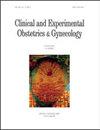子宫内膜机械刺激对IVF/ICSI宫腔镜检查结果正常的妇女的影响:一项荟萃分析
IF 0.6
4区 医学
Q4 OBSTETRICS & GYNECOLOGY
引用次数: 1
摘要
背景:研究宫腔镜子宫内膜机械刺激是否能改善体外受精(IVF)/卵浆内单精子注射(ICSI)患者的妊娠结局。方法:我们从PubMed、Embase、Cochrane Library、Web of Science等电子数据库开始到2021年2月20日进行了系统搜索,并进行了手动搜索。检索所有关于宫腔镜子宫内膜机械刺激对IVF/ICSI结果影响的出版物。两名评审员使用严格的纳入和排除标准对检索到的研究进行了独立筛选;随后提取数据,并评估偏倚风险。使用Revman 5.3对所选研究进行荟萃分析。结果:8项涉及1494名患者的研究符合入选条件,包括5项随机对照试验和3项前瞻性非随机同时对照实验研究。我们发现,与对照组相比,宫腔镜子宫内膜机械刺激有效地提高了活产率[风险比(RR)=2.15,95%置信区间(CI)(1.78,2.60),p<0.00001]和临床妊娠率[RR=1.95,95%CI(1.28,2.98),p=0.002],还降低了流产率[RR=0.54,95%CI,在接受第一个IVF/ICSI周期的患者中,在黄体期给予宫腔镜子宫内膜机械刺激与显著较高的活产率和临床妊娠率以及显著较低的流产率相关。讨论:子宫内膜机械刺激可以提高IVF/ICSI患者的活产率、临床妊娠率,并降低宫腔镜检查结果正常的流产率。如果在黄体期和第一个IVF/ICSI周期的患者中进行这种治疗,其益处可能会更大。然而,由于纳入的研究和可变刺激方法的数量和质量有限,应谨慎解释这些发现,需要更多高质量的研究来证实这一结论。本文章由计算机程序翻译,如有差异,请以英文原文为准。
The impact of endometrial mechanical stimulation in women with normal hysteroscopic findings undergoing IVF/ICSI: a meta-analysis
Background: To investigate whether hysteroscopic endometrial mechanical stimulation improves pregnancy outcomes in patients undergoing in vitro fertilization (IVF)/intracytoplasmic sperm injection (ICSI).Methods: We conducted a systematic search in electronic databases including PubMed, Embase, Cochrane Library, Web of Science from their inception to Feb 20th, 2021, as well as a manual search. All publications on the impact of hysteroscopic endometrial mechanical stimulation on IVF/ICSI outcomes were retrieved. Two reviewers independently screened the retrieved studies using stringent inclusion and exclusion criteria; data were subsequently extracted, and risk of bias was assessed. Meta-analysis of the selected studies was performed using Revman 5.3. Results: Eight studies involving 1494 patients were eligible for inclusion, including 5 randomized controlled trials and 3 prospective non-randomized simultaneous controlled experimental studies. We found that compared with the control group, hysteroscopic endometrial mechanical stimulation effectively increased live birth rate [risk ratio (RR) = 2.15, 95% confidence interval (CI) (1.78, 2.60), p< 0.00001] and clinical pregnancy rate [RR = 1.95, 95% CI (1.28, 2.98), p = 0.002], and also decreased abortion rate [RR = 0.54, 95% CI (0.35, 0.86), p = 0.009]. Subgroup analyses revealed that, hysteroscopic endometrial mechanical stimulation administered in the luteal phase in patients undergoing their first IVF/ICSI cycle was associated with significantly higher live birth rate and clinical pregnancy rate, as well as a significantly lower abortion rate. Discussion: Endometrial mechanical stimulation may improve live birth rate, clinical pregnancy rate and reduce abortion rate in patients with normal hysteroscopic findings who are undergoing IVF/ICSI. The benefits may be even greater if this therapy is given in the luteal phase and in patients who are in their first IVF/ICSI cycle. However, due to the limited quantity and quality of the included studies and variable stimulation methods, these findings should be interpreted with caution, and more high-quality studies are needed to confirm this conclusion.
求助全文
通过发布文献求助,成功后即可免费获取论文全文。
去求助
来源期刊
CiteScore
0.50
自引率
0.00%
发文量
241
审稿时长
1 months
期刊介绍:
CEOG is an international, peer-reviewed, open access journal. CEOG covers all aspects of Obstetrics and Gynecology, including obstetrics, prenatal diagnosis, maternal-fetal medicine, perinatology, general gynecology, gynecologic oncology, uro-gynecology, reproductive medicine, infertility, reproductive endocrinology, sexual medicine. All submissions of cutting-edge advances of medical research in the area of women''s health worldwide are encouraged.

 求助内容:
求助内容: 应助结果提醒方式:
应助结果提醒方式:


